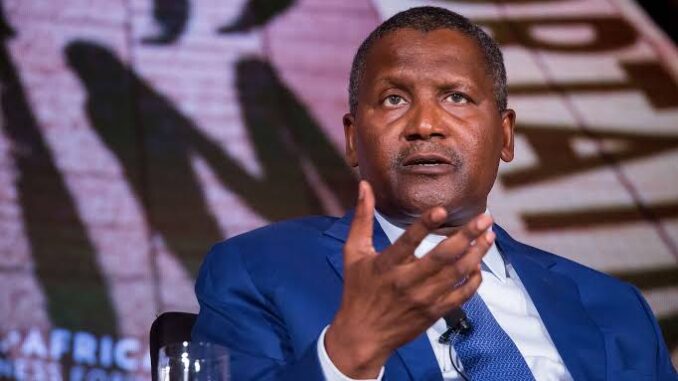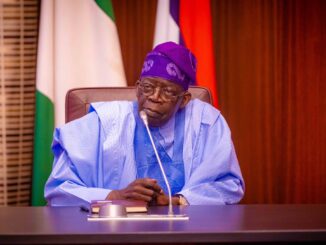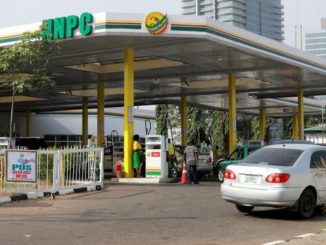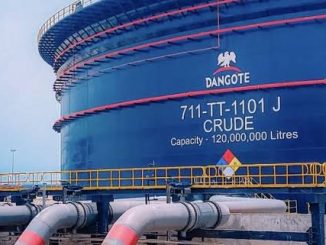
By Marvellous Nyang
July 22, 2024
In a significant development, Aliko Dangote, Africa’s richest man, has offered to sell his stake in the multi-billion-dollar oil refinery to NNPC Limited.
This comes as tensions rise with key equity partners and regulatory bodies in Nigeria.
The Dangote Refinery, with a capacity of 650,000 barrels per day, began operations last year after over ten years of construction and at a cost of $19 billion.
It was initially estimated to cost half that amount. The refinery was expected to decrease Nigeria’s dependence on imported fuel and conserve a substantial portion of the foreign exchange used for imports.
“Let them (NNPCL) buy me out and run the refinery the best way they can. They have labelled me a monopolist. That’s an incorrect and unfair allegation, but it’s OK. If they buy me out, at least, their so-called monopolist would be out of the way,” Dangote said in an exclusive interview with Premium Times.
The refinery, which is set to begin distributing petrol to the Nigerian market in August, has been operating at just over half its capacity since January due to challenges in securing crude oil from international suppliers.
According to Dangote, many suppliers are either demanding exorbitant premiums or claiming unavailability of the product. Despite an agreement with NNPC for a 20% equity stake and supply deal, only 7.2% of this stake has been paid for, and NNPC has only delivered 6.9 million barrels of oil to the refinery by May.
At 67, Dangote expressed a desire to focus on his legacy rather than ongoing business conflicts. “I am 67 years old, in less than three years, I will be 70. I need very little to live the rest of my life. I can’t take the refinery or any other property or asset to my grave. Everything I do is in the interest of my country,” he stated.
Reflecting on the challenges, Dangote mentioned that some of his friends had warned him about the risks of such a significant investment in Nigeria due to policy inconsistencies and vested interests. He shared,
“That friend has been taunting me in the past few days, saying he warned me and that he has been proven right.”
The situation intensified last month when Devakumar Edwin, Dangote Group’s vice president for oil and gas, accused the Nigerian Midstream and Downstream Petroleum Regulatory Authority (NMDPRA) of permitting the importation of substandard fuel.
ALSO READ: How Dangote outsmarted global oil mafia to build world’s largest refinery in Nigeria
In response, NMDPRA’s chief, Farouk Ahmed, claimed that diesel from Dangote’s refinery and other local producers had high sulphur levels, which are harmful to vehicle engines and the environment.
“The AGO quality in terms of sulphur is the lowest as far as West Africa’s requirement of 50 parts per million (ppm). Dangote refinery, as well as some major refineries like Waltersmith refinery, produce between 650 ppm to 1,200 ppm. So, in terms of quality, their quality is much more inferior to the imported quality,” Ahmed stated.
However, during a tour of the refinery by members of the House of Representatives, Dangote refuted these claims.
Lab tests showed that Dangote’s diesel had a sulphur content of 87.6 ppm, significantly lower than the levels in imported samples, which exceeded 1800 ppm and 2000 ppm.
Dangote called for an impartial assessment to compare the quality of locally refined products with imports, advocating for what best serves Nigeria’s interests.
Additionally, Dangote announced halting plans to invest in Nigeria’s steel industry to avoid further accusations of monopolistic practices.
“Actually, our board has decided that we shouldn’t do the steel because if we do the steel business, we will be called all sorts of names like monopoly. And then also, imports will be encouraged,” he said.
This unfolding situation underscores the complex landscape for investors in Nigeria’s energy sector and the ongoing challenges in achieving self-sufficiency in fuel production.




